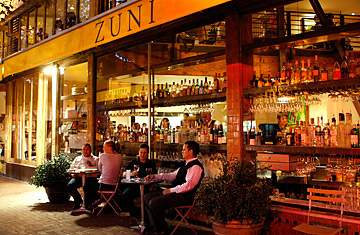
Patrons outside Zuni Café in San Francisco
(2 of 2)
Wave Off the Bread Man
Nobody wants more bread. Nobody wants to be interrupted. Wave him off before he even tries to speak. His bread isn't even warm anyway.
Your Reservation Is Sacred
A reservation is like a wedding vow, except more binding. If you make one and break it, you are stealing money from the restaurant; if they don't honor it or make you sit at the bar for more than 10 minutes, they are stealing your time and killing your buzz, which in both cases means stealing your money. One thing that has become annoying about modern restaurants is the use of the reservation line as a propaganda device: by claiming that there are no tables between 6 and 10 p.m., many restaurants hope to attain the popularity they claim, in an evil interpretation of Dale Carnegie's positive-thinking program. Don't allow them to do this. Never accept any reservation earlier than 7 or later than 9 unless you want it. And always be on time with your whole party (minus one, if necessary).
Food: The Limits of Control
There's a tug of war going on between you and the restaurant. It's a battle of wills, and in such a battle the restaurant always wins. The most nakedly coercive form of control, of course, is the dreaded tasting menu, for which the chef sends out 11 tiny portions of food, each one carefully designed to not satisfy you, with the experience requiring less input from you than a nurse requires from an obliging spinal-trauma patient. Even when the issue is simply what's on the menu; what sequence you can have it in; what, if any, substitutions you are allowed; how you may order the meat; or even so small a matter as having salt and pepper, it is an ongoing negotiation. Because of the strained air of informality, it's hard for any except the most domineering of chefs (see Chang, David) to just tell people what they can and can't have. Therefore, if you ask nicely for something reasonable, such as a saltshaker or to have the pasta as a mid-course, they probably will accommodate you. And every restaurant will, out of sheer terror and self-preservation, act on any warning about food allergies. A rule of thumb should be how much your request will screw up the kitchen. Changing your order 20 minutes after it went in? Can't be done, shouldn't be asked. Asking for a side order of something that doesn't normally come with your dish? Why not? Let them decide whether to alienate you for no good reason.
Today's restaurants look and act different, but their needs, and yours, haven't changed. They need money and repeat business; you need a good experience. It shouldn't be that hard for everyone to get what they want.
Ozersky is a James Beard Award–winning food writer and the author of The Hamburger: A History. You can listen to his weekly show at the Heritage Radio Network and read his column on home cooking at Rachael Ray's website. He is currently at work on a biography of Colonel Sanders.
